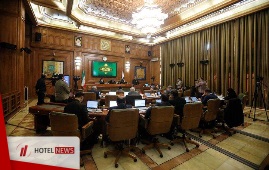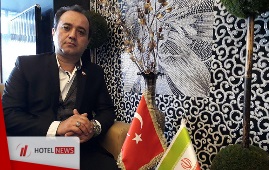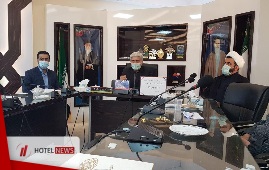
The annexation plan was approved as an increase in the legal value resulting from the implementation of urban development plans in paragraph "d" of the decree "Organization and development of tourism facilities in the city of Tehran." Some tourism projects are suspending this decree, and if completed, the activities of tourism activists will be done more quickly. Investors in the tourism industry will lose the economic justification of their projects if they pay taxes on the increase in legal value resulting from the implementation of development projects.
Create: Sep 21, 2020 Edit: Sep 21, 2020 Regional News
"Farzin Hagdal", the Deputy Minister of Economy and Investment of Chabahar Free Zone, said in an exclusive interview with Hotel News; All necessary permits and standards have been obtained for the construction of Chabahar International Airport, and the Chabahar Free Zone is committed to completing this project. The Chabahar Free Zone is the gateway for domestic and foreign tourists to the southeast of the country, especially the Makran coast. Disputes over the past years have hampered the development of the Chabahar Free Zone in various areas, including tourism infrastructure, such as the construction of an international airport.
Create: Sep 15, 2020 Edit: Sep 19, 2020 Regional News
The British tourism giant, which declared bankruptcy last year, plans to resume its activities online. Of course, the license for this activity has not been issued yet and its time is not known, but Thomas Cook, unlike the past, will not possess a hotel, a plane and a shop.
Create: Sep 12, 2020 Edit: Sep 13, 2020 International News
"Saeed Azari" CEO of Khuzestan Folad football Club; The hotel is usually for the wedding venue. It is surprising that a large club chooses a hotel to negotiate and lowers that club's reputation.
Create: Sep 9, 2020 Edit: Sep 9, 2020 Regional News
"Ali Malmir" General Manager of Cultural Heritage, Tourism and Handicrafts of Hamadan Province; The construction of a hotel near Ali Sadr Cave is an obstacle to world registration and has no justification for UNESCO. The General Directorate of Cultural Heritage and Tourism opposed the construction of the hotel and legal action was taken, but the operation license was issued by Dehyari.
Create: Sep 6, 2020 Edit: Sep 6, 2020 Regional News
"Behzad Shojaei" reported in an interview with Hotel News; During negotiations with the CEO of the Asia Exhibition Company and the Turkish parties, the offer of this entry permit was made, which was also welcomed. It was decided that the issue of issuing entry permits to the city of Van for Iranian specialized centers and visitors in this exhibition will be reviewed and the final result will be announced. Restrictions and obstacles should not lead to the closure of tourism activities, but can be avoided with reasonable solutions to these challenges so that the tourism industry does not suffer from operational paralysis.
Create: Sep 5, 2020 Edit: Sep 6, 2020 Regional News
Technique 181 Understand When to Mention Your Hotel’s Name When Responding to Consumer Blogs; When responding to a negative online review, the name of the hotel should never be mentioned in the response. Con- versely, when responding to a positive online review, the name of the hotel should always be mentioned in the response. Technique 182 Understand When to Use “I” or “We” When Responding to Consumer Blogs; When responding to a negative online review, the hotel manager should use ‘I’ in the online response (e.g., ‘I will look into this issue’). The use of the word “I” signals owner- ship of the problem and resolution. On the other hand, when responding to a positive online review, the manager should use ‘we’ to spread the credit among the staff (e.g., ‘we are very glad that you enjoyed your stay’). Technique 183 Paraphrase the Problem When Responding to Negative Consumer Blogs; When responding to a negative online review, the hotel manager should paraphrase the guest’s concern in the online response. Such paraphrasing communicates to all those read- ing the response that the hotel has good listening skills. Technique 184 Include a ‘Relate’ Statement When Responding to Negative Consumer Blogs; When responding to a negative online review, the hotel manager should attempt to include a statement detailing how s/he can relate to the problem being communicated by the guest. Including a ‘relate’ statement communicates to all those reading the response that the hotel is empathetic to guests’ concerns. Technique 185 Require One New Idea Per Week; At every weekly management meeting, one manager should be required to share an innovative idea with the group that has never been attempted in the hotel. Technique 186 Graph Guest Problems According to Frequency and Seriousness; Guest problems should be tracked and plotted on a graph according to their frequency and seriousness. A cross-depart- mental team of 6–8 line-level associates and managers should be created to derive strategies for fixing the most pressing problems based upon frequency and/or seriousness. Technique 187 Text Mine Consumer Blogs for Trends; Hotel management should contract with a 3rd party ven- dor (e.g., Revinate) so that consumers’ blog postings can be analyzed for trends. Many of these 3rd party vendor products also enable management to monitor trends in competitors’ blog postings. Technique 188 Data Mine the Centralized Reservations System for Trends; Hotel management should data mine its centralized res- ervation system to identify non-obvious patterns and trends in guests’ habits and preferences. The results of such data mining can be used to better serve guests, but also to build an enhanced understanding of proper timing and placement of marketing messages. Chain affiliated hotels likely already have data mining services available to them. Managers at inde- pendent hotels can be taught some basic data mining func- tions by a consultant. The extent of data mining capabilities offered by 3rd party management companies appears to vary widely across the industry. Technique 189 Utilize the Front Desk as a Listening Post; Front desk associates should consider their work area a “listening post” from which they can overhear conversations between guests. Many guests may be reluctant to actively voice complaints to hotel staff, but discuss various issues among themselves (e.g., the ice machine was too noisy; the sidewalks leading to the parking lot were too icy). Such information should be entered into the logbook and denoted as “listening post feedback.”
Create: Sep 5, 2020 Edit: Oct 18, 2020 Hotel Management
Jamshid Hamzehzadeh, President of the Iranian Hoteliers Association; Currently, many hotels in the country offer discounts of 50 to 60%, but still do not have customers. The basis for the increase in hotel rates is the annual inflation rate, but even last year, when inflation was announced at 53%, hotels increased their prices by 10 to 15%.
Create: Sep 5, 2020 Edit: Sep 5, 2020 Regional News
Chalous Governor Mohammad Nasser Zandi explained; About 1,200 billion tomans of investment has been predicted for the construction of this five-star hotel. Over the past two years, with the support of executive officials, the investor has obtained a construction permit and part of the initial operations have been carried out. This hotel will be built on a land with an area of more than 26,000 square meters, infrastructure of more than 71,000 square meters on 12 floors with a capacity of 500 beds.
Create: Aug 29, 2020 Edit: Aug 29, 2020 Regional News
Technique 176 Maintain a Clutter-Free Office; All managers should keep their offices impeccably neat and orderly because doing so subconsciously signals the importance of cleanliness and attention to detail to associates. Technique 177 Keep a Log of Guest Requests; A culture must be fostered in which it is apparent to both guests and employees that management cares about guests and their requests. All guest requests should be followed up on. A good way to do this is to create a log (example below). Not only does this log help ensure follow-up, but it gives the manager an opportunity to review requests and see if there are consistencies so these issues do not continue to occur. Technique 178 Be Visible and Converse with Guests; Most guests appreciate meeting and conversing with managers. Managers should make it a point to either assist with check-ins or roam the lobby during peak check-in or check-out. Conversations with management help personalize the check-in/check-out process. Such interactions also often uncover leads for new business and set a good example for the associates regarding the importance of interactions. Technique 179 Display Attention to Detail by Cleaning the Floor; All managers should pick up lint and other small specks of debris as they move through the hotel’s public areas. While very small items on the floor are likely unnoticeable to most guests, picking them up signals attention to detail to associates. Technique 180 Invite a Consultant to Hold Guest Surprise Clinics with Associates; Hotel management should invite a consultant to the hotel to conduct a guest surprise clinic with associates and manag- ers. Facilitated by the consultant, the clinic would span two hours and would involve associates and managers collectively brainstorming free/inexpensive ways to surprise guests. Man- agement’s participation in the clinic would signal their com- mitment to the associates. The consultant could repeat the clinic in the am and pm to maximize associate and manager participation.
Create: Aug 25, 2020 Edit: Sep 29, 2020 Hotel Management
